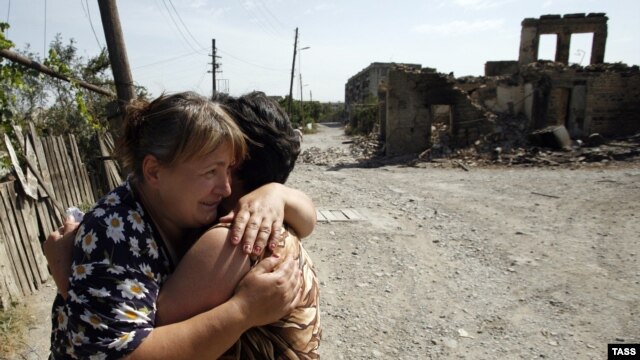Saakashvili: Georgia was ready to trade NATO for breakaway regions
| Publisher | Radio Free Europe/Radio Liberty |
| Publication Date | 8 August 2013 |
| Cite as | Radio Free Europe/Radio Liberty, Saakashvili: Georgia was ready to trade NATO for breakaway regions, 8 August 2013, available at: https://www.refworld.org/docid/521f4621b.html [accessed 29 May 2023] |
| Disclaimer | This is not a UNHCR publication. UNHCR is not responsible for, nor does it necessarily endorse, its content. Any views expressed are solely those of the author or publisher and do not necessarily reflect those of UNHCR, the United Nations or its Member States. |
August 08, 2013
By RFE/RL
 Two women hug each other amid ruins in the South Ossetian capital of Tskhinvali, which was devastated by the brief Georgian-Russian conflict in 2008.
Two women hug each other amid ruins in the South Ossetian capital of Tskhinvali, which was devastated by the brief Georgian-Russian conflict in 2008.
Georgian President Mikheil Saakashvili has said on the eve of the fifth anniversary of war between Georgia and Russia that he tried to avert the conflict by proposing that Georgia would abandon ambitions to join NATO in return for Moscow's help with South Ossetia and Abkhazia.
Speaking in a prerecorded interview on Georgia's Rustavi-2 TV broadcast on August 7, Saakashvili said the offer was made to Russian President Vladimir Putin at an informal summit of the Commonwealth of Independent States in Moscow. That summit was held in February 2008.
"We told [Putin] that we were ready to say 'no' to NATO," Saakashvili said, adding that he wanted help with its two breakaway territories and, in return, Georgia and was ready to recognize Russian interests in Abkhazia.
Saakashvili claimed that "Putin did not even think for a minute" about the Georgian proposal.
"[Putin] smiled and said, 'We do not exchange your territories for your geopolitical orientation,'" Saakashvili said. "And it meant 'we will chop off your territories anyway.'"
Saakashvili also claimed he pressed Putin to help find a way to quell the growing tensions along the borders with South Ossetia.
Saakashvili maintained that, from Russia's point of view, the war in 2008 could only have been prevented if Georgia had "become a failed state."
The Georgian president also said fence-mending with Moscow was impossible as Tbilisi would never give up its territories, which he described as "occupied by Russia."
During the night of August 7-8, 2008, Georgian forces launched an offensive in South Ossetia, which Tbilisi – and the international community except for a few countries – still consider part of Georgia.
Medvedev Unrepentant
Russian Prime Minister Dmitry Medvedev, who was Russia's president when hostilities broke out, appeared on Rustavi-2 on August 6. He told viewers that he stood by his decision to send additional Russian forces into South Ossetia.
"l tell you this: I made this decision, and I believe it was the only right thing to do in that particular situation," he said. "There are no conditions for reconsidering this decision. That would be a bad mistake."
"If there's a state which is a member of another military-political alliance whose nuclear missiles are aimed at targets located on Russian territory, we cannot welcome this," Medvedev said.
"This is our national approach," he added. "You [Georgia] have got yours. Our national approach is as follows: Russia is a very large country with a huge nuclear arsenal – we cannot ignore this."
Elene Khoshtaria of Georgia's nongovernmental policy watchdog Georgia's Reforms Associates objected to several things Medvedev said in his interview.
She maintained that Medvedev's comments ignored Georgia's interests and that the Kremlin's "new realities" were that Georgia should recognize the independence of Abkhazia and South Ossetia.
She also described Medvedev's reference to Russia's nuclear arsenal as a statement that "contains a very direct threat."
With reporting by Rustavi-2 TV, Reuters, ITAR-TASS, and Interfax
Link to original story on RFE/RL website
